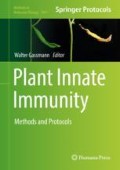Abstract
Pseudomonas syringae is a bacterium that can cause disease on a wide range of plant species including important agricultural crops. A primary virulence mechanism used by P. syringae to infect host plants is the type III secretion system (T3SS), a syringe-like structure that delivers defense-suppressing proteins directly into plant cells. Genes encoding the T3SS are not transcribed in P. syringae prior to contact with a potential host plant and must be expressed during initial stages of infection. Specific organic and amino acids exuded by plants were recently identified as signals that can induce expression of T3SS-associated genes. Here we describe a technique to produce exudates from intact Arabidopsis seedlings and evaluate the exudates for the presence of these bioactive metabolites. We provide procedures for exudate production as well as downstream assays to assess T3SS gene expression using a GFP transcriptional reporter. We also describe methods for preparing high-quality protein and RNA from exudate-treated bacteria to directly assess changes in mRNA and protein abundance. These methods could be used to investigate mechanisms regulating P. syringae perception of plant metabolites as well as the release of these substances by the plant, and more generally to investigate host signals perceived by other phytopathogens.
Access this chapter
Tax calculation will be finalised at checkout
Purchases are for personal use only
References
Xin XF, He SY (2013) Pseudomonas syringae pv. tomato DC3000: a model pathogen for probing disease susceptibility and hormone signaling in plants. Annu Rev Phytopathol 51:473–498
Abramovitch RB, Anderson JC, Martin GB (2006) Bacterial elicitation and evasion of plant innate immunity. Nature Rev Mol Cell Bio 7:601–611
Büttner D, He SY (2009) Type III protein secretion in plant pathogenic bacteria. Plant Physiol 150:1656–1664
Tang X, Xiao Y, Zhou JM (2006) Regulation of the type III secretion system in phytopathogenic bacteria. Mol Plant Microbe Interact 19:1159–1166
Salmeron JM, Staskawicz BJ (1993) Molecular characterization and hrp dependence of the avirulence gene avrPto from Pseudomonas syringae pv. tomato. Mol Gen Genet 239:6–16
Rahme L, Mindrinos M, Panopoulos N (1991) Genetic and transcriptional organization of the hrp cluster of Pseudomonas syringae pv. phaseolicola. J Bacteriol 173:575–586
Huynh TV, Dahlbeck D, Staskawicz BJ (1989) Bacterial blight of soybean: regulation of a pathogen gene determining host cultivar specificity. Science 245:1374–1377
Anderson JC, Bartels S, Gonzalez Besteiro MA et al (2011) Arabidopsis MAP Kinase Phosphatase 1 (AtMKP1) negatively regulates MPK6-mediated PAMP responses and resistance against bacteria. Plant J 67:258–268
Anderson JC, Wan Y, Kim Y-M et al (2014) Decreased abundance of type III secretion system-inducing signals in Arabidopsis mkp1 enhances resistance against Pseudomonas syringae. Proc Natl Acad Sci 111:6846–6851
King EO, Ward MK, Raney DE (1954) Two simple media for the demonstration of pyocyanin and fluorescin. J Lab Clin Med 44:301–307
Kovach ME, Elzer PH, Hill DS et al (1995) Four new derivatives of the broad-host-range cloning vector pBBR1MCS, carrying different antibiotic-resistance cassettes. Gene 166:175–176
Chang JH, Urbach JM, Law TF et al (2005) A high-throughput, near-saturating screen for type III effector genes from Pseudomonas syringae. Proc Natl Acad Sci 102:2549–2554
Dettmer K, Aronov PA, Hammock BD (2007) Mass spectrometry-based metabolomics. Mass Spectrom Rev 26:51–78
Kueger S, Steinhauser D, Willmitzer L et al (2012) High-resolution plant metabolomics: from mass spectral features to metabolites and from whole-cell analysis to subcellular metabolite distributions. Plant J 70:39–50
Acknowledgments
Research in the Anderson laboratory is funded by NSF grant 1557694 and Oregon Agricultural Research Foundation grant 8518A.
Author information
Authors and Affiliations
Corresponding author
Editor information
Editors and Affiliations
Rights and permissions
Copyright information
© 2019 Springer Science+Business Media, LLC, part of Springer Nature
About this protocol
Cite this protocol
Rogan, C.J., Anderson, J.C. (2019). Isolation and Characterization of Plant Metabolite Signals that Induce Type III Secretion by the Plant Pathogen Pseudomonas syringae. In: Gassmann, W. (eds) Plant Innate Immunity. Methods in Molecular Biology, vol 1991. Humana, New York, NY. https://doi.org/10.1007/978-1-4939-9458-8_13
Download citation
DOI: https://doi.org/10.1007/978-1-4939-9458-8_13
Published:
Publisher Name: Humana, New York, NY
Print ISBN: 978-1-4939-9457-1
Online ISBN: 978-1-4939-9458-8
eBook Packages: Springer Protocols

